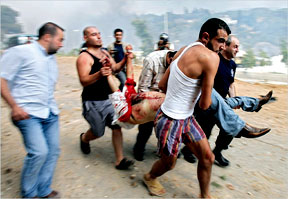|
observer |
|
|
|
|
|
OTHER LINKS |

|

|

|
Diplomats seek foreign patrols for Mideast
Prime Minister Tony Blair of Britain and Secretary General Kofi Annan of the United Nations called for an international force in southern Lebanon to end the fighting between Israel and the Hezbollah militia. The United States and Israel reacted skeptically, with President Bush urging tartly that Mr. Annan telephone President Bashar al-Assad of Syria, a key sponsor of Hezbollah, "and make something happen." In Russia for a Group of 8 summit meeting, Mr. Bush expressed his views to Mr. Blair, using a vulgarity that was caught by an open microphone. With the Lebanese death toll exceeding 200 and the Israeli count at 24, the increased efforts to turn to diplomacy showed little prospect of an immediate way out. In Lebanon, a vast majority of those killed were civilians, while in Israel about half of the dead were civilians. In a televised speech to the Israeli Parliament, Prime Minister Ehud Olmert vowed to continue the offensive until Hezbollah freed two captured Israeli soldiers, the Lebanese Army was deployed along the border, and Hezbollah was effectively disarmed. Hezbollah has consistently rejected those terms. Secretary of State Condoleezza Rice will travel to the Middle East to try to resolve the crisis, Bush administration officials said. The timing is still up in the air, and the trip will be a gamble. Israel's ambassador to the United States, Daniel Ayalon, said on CNN that it might be too soon for Ms. Rice to accomplish anything. Attacking Lebanon
Israel intensified its bombing across Lebanon hitting an army barracks in Tripoli and bases in Baalbek, both in the north. It shelled fuel tanks in Beirut's port and continued pounding southern Lebanon and Beirut's southern suburbs. In the afternoon, Israel made a brief ground raid into Lebanon. Israeli military officials said they succeeded in hitting a rocket launcher in Beirut carrying one of Hezbollah's longest-range rockets, an Iranian Zelzal, with a range of 62 to 124 miles. The attack caused the rocket to flare in the air, leading to reports that an Israeli plane might have been shot down. At least 43 Lebanese were killed Monday, according to Lebanese authorities, raising the toll to more than 200 since the Israeli offensive began Thursday. In one large group of fatalities, a missile hit a minibus, killing 12 civilians as they were driving through Rmeileh, a seaside town south of Beirut. [Early Tuesday, Israeli warplanes pounded south Lebanon, killing six members of a family in Aytaroun village, Reuters reported.] Rocket firesSome 30 rockets fired by Hezbollah hit Haifa and other parts of northern Israel. One rocket leveled much of an apartment house, critically wounding one person. Another Hezbollah rocket landed next to a hospital in Safed, slightly wounding six people. Israel's rejection of an international force stems partly from recent history. The foreign minister, Tzipi Livni, said in an interview that such a force must be able to intervene, unlike the current troops, the United Nations Interim Force in Lebanon, or Unifil, which was established in 1978. "We have an experience with Unifil," she said: When an Israeli was seized previously, "they just watched." The Israeli military wants to continue its largely aerial campaign against Hezbollah, with one senior Israeli official suggesting that Hezbollah's capacity to launch missiles had already been degraded "about 30 percent."
Brig. Gen. Ido Nehushtan, on the Israeli general staff, said, "We have damaged Hezbollah but they still have significant operational capacity." He noted the decline in rockets launched into Israel in the last two days - an average of 40 a day, down from initial highs of 150 - and said it was a testament to the damage caused by the Israelis. "It will take time, it's more than a matter of days on the military side," he said. "We aim to change the situation and not go back to where we are." Israel's deputy chief of staff, Maj. Gen. Moshe Kaplinski, told Agence France-Presse: "The operation will last for at least another week. The international pressure on Israel will allow us to continue for another week at least." In his speech, Prime Minister Olmert said, "The terrorist organizations we are fighting take their orders from the Tehran-Damascus axis of evil." He said Israel would continue to fight until both Hezbollah and Hamas stopped attacks on Israel. "In Lebanon, we will fight to enforce the demands long voiced by the international community," he said. He demanded "an absolute end to fire" from Hezbollah, "the deployment of the Lebanese Army all along the southern border, and the departure of Hezbollah from this region and fulfilment of U.N.Security Council Resolution 1559." UN security council resolutionThat resolution calls for the pullout of all foreign forces from Lebanon, the disbanding and disarmament of all militias and the deployment of the Lebanese Army on the border. But the Security Council included no provisions to implement the agreement, and the Lebanese government, which contains some Hezbollah ministers, is considered too weak to do so. Hezbollah is supported by Iran and Syria, and Mr. Bush's pungent conclusion, as he summarized it to Mr. Blair in Russia was, "What they need to do is get Syria to get Hezbollah to stop doing this shit, and it's over." The current conflict began when Hezbollah fighters crossed into Israel and captured two Israeli soldiers on July 12, and Israel immediately attacked Hezbollah positions in Lebanon, calling the initial incursion an act of war. Hezbollah, a radical Shiite group, was established with Iranian help in 1982 to fight Israel, and both Iran and Syria supply the group with money and weaponry. "Israel is making it possible for the Lebanese government to move in," Foreign Minister Livni said. "In a way, Israel is doing the Lebanese government's job for it" by taking on Hezbollah, which has been a state-within-a-state in southern Lebanon and southern Beirut. "Israel shares the same goals as the international community, and for us the best option is full implementation of 1559," Ms. Livni said. "That's the way out of this crisis, and now is the time to implement it." It was a great accomplishment to get the Syrians largely out of Lebanon, she said, but there is more to do. "The Syrians have left," she said, "but they have a kind of branch in Lebanon, and Hezbollah keeps an open front for Iran with Israel." At the United Nations, the Security Council went into its third session on Lebanon in four days, but beforehand John R. Bolton the American ambassador, discouraged talk of a multilateral force. Three questions must be addressed, he said: "Would such a force be empowered to deal with the real problem? The real problem is Hezbollah. Would it be empowered to deal with countries like Syria and Iran that support Hezbollah?" Third, he said, was how a new force would improve on Unifil or help strengthen Lebanese institutions. Strengthening the Lebanese institutionsAsked why the United States was not backing an immediate cease-fire, he said, "We could have a cease-fire in a matter of nanoseconds if Hezbollah and Hamas would release their kidnap victims and would stop engaging in rocket attacks and other acts of terrorism against Israel." A United Nations mission dispatched by Mr. Annan to the region will make its first visit to Israel on Friday and return to report at the end of the week. Initially, Mr. Olmert refused to see the team, but changed his mind after Ms. Livni argued that a robust international force that could enforce Resolution 1559, blessed by the United Nations, would be an opportunity for Israel to be seen on the right side of international legitimacy. The Lebanese prime minister, Fouad Siniora, met with Mr. Annan's team and said afterward, "We don't want to talk about any steps before they become concrete, and I want to assure the Lebanese people that we are exerting all possible efforts to resolve the crisis." Michael Young, a Lebanese political analyst, said: "The Israelis are creating a humanitarian and social and economic crisis. But there is also a great deal of anger in the country at Hezbollah for inviting disaster on Lebanon." Officials in Washington said an attack on Friday on an Israeli naval vessel by a C-802 anti-ship cruise missile was Hezbollah's most sophisticated to date. Given that advanced radar is needed to guide a C-802 to its target, Israeli officials have accused the Lebanese military of directly aiding Hezbollah fighters, and Israeli jets struck several radar targets in Lebanon over the weekend. Of the 13,000 missiles and rockets estimated to be in Hezbollah's arsenal, about 11,000 are believed to have been shipped from Iran. Western intelligence officials also say Syria has armed Hezbollah with short- and medium-range rockets, some of which have been used in the current attacks on Israel. Evacuation plansWestern governments were rushing to set up evacuation plans for thousands of foreigners living in Lebanon or on vacation there. British military helicopters started carrying some out of Lebanon on Monday. A Greek passenger ferry chartered by the French government reached Beirut Monday afternoon and loaded about 1,200 people before heading for Cyprus. Norway, Sweden, Italy and Ukraine also started organizing the departure of their citizens. The United States is planning to start evacuating its citizens on Tuesday. The embassy said there was no mandatory evacuation. There are 8,000 Americans registered with the embassy, but the number of Americans or Lebanese also holding American citizenship could be three times larger. At the Pentagon on Monday, officials said a commercial passenger ship had been contracted to ferry Americans from Lebanon to Cyprus. Bryan Whitman, a Pentagon spokesman, said the ship, the Orient Queen, would be able to carry 750 passengers at a time on the five-hour trip. A Navy destroyer would be available to escort the ship, Mr. Whitman said. By early Monday, 64 Americans, designated by the embassy as having special needs, had been evacuated by Marine helicopters. In front of the French Consulate in Beirut, stranded tourists and foreign residents lugged their bags and lined up to register for evacuation. "I'm worried this may drag on, and I'm leaving," said Souad Mehdi, 32, a French citizen on vacation with her two sons. "My heart and thoughts are still here with my family and friends. I am scared I won't see them again." Steven Erlanger reported from Jerusalem for this article, and Jad Mouawad from Beirut. Reporting was contributed by Jim Rutenberg and C. J. Chivers from St. Petersburg, Russia; Warren Hoge from the United Nations; and Helene Cooper, Thom Shanker and Mark Mazzetti from Washington. |










